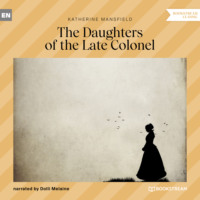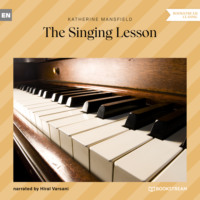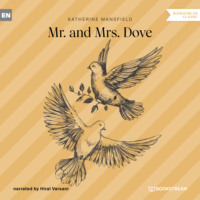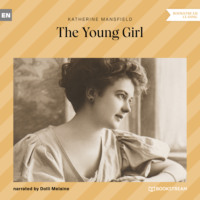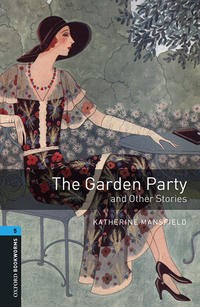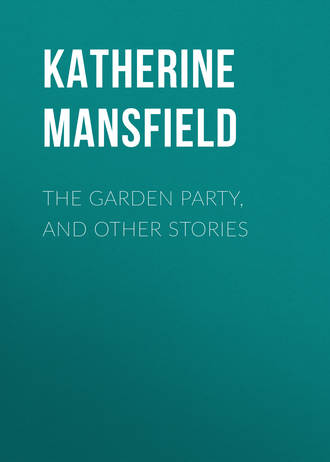 полная версия
полная версияThe Garden Party, and Other Stories
“How are the children, John?” she asked.
(Hang the children!) “Perfectly well. Never better in their lives.”
“Haven’t they sent me letters?”
“Yes, yes—of course! I’ve left them at the hotel for you to digest later on.”
“We can’t go quite so fast,” said she. “I’ve got people to say good-bye to—and then there’s the Captain.” As his face fell she gave his arm a small understanding squeeze. “If the Captain comes off the bridge I want you to thank him for having looked after your wife so beautifully.” Well, he’d got her. If she wanted another ten minutes—As he gave way she was surrounded. The whole first-class seemed to want to say good-bye to Janey.
“Good-bye, dear Mrs. Hammond! And next time you’re in Sydney I’ll expect you.”
“Darling Mrs. Hammond! You won’t forget to write to me, will you?”
“Well, Mrs. Hammond, what this boat would have been without you!”
It was as plain as a pikestaff that she was by far the most popular woman on board. And she took it all—just as usual. Absolutely composed. Just her little self—just Janey all over; standing there with her veil thrown back. Hammond never noticed what his wife had on. It was all the same to him whatever she wore. But to-day he did notice that she wore a black “costume”—didn’t they call it?—with white frills, trimmings he supposed they were, at the neck and sleeves. All this while Janey handed him round.
“John, dear!” And then: “I want to introduce you to—”
Finally they did escape, and she led the way to her state-room. To follow Janey down the passage that she knew so well—that was so strange to him; to part the green curtains after her and to step into the cabin that had been hers gave him exquisite happiness. But—confound it!—the stewardess was there on the floor, strapping up the rugs.
“That’s the last, Mrs. Hammond,” said the stewardess, rising and pulling down her cuffs.
He was introduced again, and then Janey and the stewardess disappeared into the passage. He heard whisperings. She was getting the tipping business over, he supposed. He sat down on the striped sofa and took his hat off. There were the rugs she had taken with her; they looked good as new. All her luggage looked fresh, perfect. The labels were written in her beautiful little clear hand—“Mrs. John Hammond.”
“Mrs. John Hammond!” He gave a long sigh of content and leaned back, crossing his arms. The strain was over. He felt he could have sat there for ever sighing his relief—the relief at being rid of that horrible tug, pull, grip on his heart. The danger was over. That was the feeling. They were on dry land again.
But at that moment Janey’s head came round the corner.
“Darling—do you mind? I just want to go and say good-bye to the doctor.”
Hammond started up. “I’ll come with you.”
“No, no!” she said. “Don’t bother. I’d rather not. I’ll not be a minute.”
And before he could answer she was gone. He had half a mind to run after her; but instead he sat down again.
Would she really not be long? What was the time now? Out came the watch; he stared at nothing. That was rather queer of Janey, wasn’t it? Why couldn’t she have told the stewardess to say good-bye for her? Why did she have to go chasing after the ship’s doctor? She could have sent a note from the hotel even if the affair had been urgent. Urgent? Did it—could it mean that she had been ill on the voyage—she was keeping something from him? That was it! He seized his hat. He was going off to find that fellow and to wring the truth out of him at all costs. He thought he’d noticed just something. She was just a touch too calm—too steady. From the very first moment—
The curtains rang. Janey was back. He jumped to his feet.
“Janey, have you been ill on this voyage? You have!”
“Ill?” Her airy little voice mocked him. She stepped over the rugs, and came up close, touched his breast, and looked up at him.
“Darling,” she said, “don’t frighten me. Of course I haven’t! Whatever makes you think I have? Do I look ill?”
But Hammond didn’t see her. He only felt that she was looking at him and that there was no need to worry about anything. She was here to look after things. It was all right. Everything was.
The gentle pressure of her hand was so calming that he put his over hers to hold it there. And she said:
“Stand still. I want to look at you. I haven’t seen you yet. You’ve had your beard beautifully trimmed, and you look—younger, I think, and decidedly thinner! Bachelor life agrees with you.”
“Agrees with me!” He groaned for love and caught her close again. And again, as always, he had the feeling that he was holding something that never was quite his—his. Something too delicate, too precious, that would fly away once he let go.
“For God’s sake let’s get off to the hotel so that we can be by ourselves!” And he rang the bell hard for some one to look sharp with the luggage.
Walking down the wharf together she took his arm. He had her on his arm again. And the difference it made to get into the cab after Janey—to throw the red-and-yellow striped blanket round them both—to tell the driver to hurry because neither of them had had any tea. No more going without his tea or pouring out his own. She was back. He turned to her, squeezed her hand, and said gently, teasingly, in the “special” voice he had for her: “Glad to be home again, dearie?” She smiled; she didn’t even bother to answer, but gently she drew his hand away as they came to the brighter streets.
“We’ve got the best room in the hotel,” he said. “I wouldn’t be put off with another. And I asked the chambermaid to put in a bit of a fire in case you felt chilly. She’s a nice, attentive girl. And I thought now we were here we wouldn’t bother to go home to-morrow, but spend the day looking round and leave the morning after. Does that suit you? There’s no hurry, is there? The children will have you soon enough… I thought a day’s sight-seeing might make a nice break in your journey—eh, Janey?”
“Have you taken the tickets for the day after?” she asked.
“I should think I have!” He unbuttoned his overcoat and took out his bulging pocket-book. “Here we are! I reserved a first-class carriage to Cooktown. There it is—‘Mr. and Mrs. John Hammond.’ I thought we might as well do ourselves comfortably, and we don’t want other people butting in, do we? But if you’d like to stop here a bit longer—?”
“Oh, no!” said Janey quickly. “Not for the world! The day after to-morrow, then. And the children—”
But they had reached the hotel. The manager was standing in the broad, brilliantly-lighted porch. He came down to greet them. A porter ran from the hall for their boxes.
“Well, Mr. Arnold, here’s Mrs. Hammond at last!”
The manager led them through the hall himself and pressed the elevator-bell. Hammond knew there were business pals of his sitting at the little hall tables having a drink before dinner. But he wasn’t going to risk interruption; he looked neither to the right nor the left. They could think what they pleased. If they didn’t understand, the more fools they—and he stepped out of the lift, unlocked the door of their room, and shepherded Janey in. The door shut. Now, at last, they were alone together. He turned up the light. The curtains were drawn; the fire blazed. He flung his hat on to the huge bed and went towards her.
But—would you believe it!—again they were interrupted. This time it was the porter with the luggage. He made two journeys of it, leaving the door open in between, taking his time, whistling through his teeth in the corridor. Hammond paced up and down the room, tearing off his gloves, tearing off his scarf. Finally he flung his overcoat on to the bedside.
At last the fool was gone. The door clicked. Now they were alone. Said Hammond: “I feel I’ll never have you to myself again. These cursed people! Janey”—and he bent his flushed, eager gaze upon her—“let’s have dinner up here. If we go down to the restaurant we’ll be interrupted, and then there’s the confounded music” (the music he’d praised so highly, applauded so loudly last night!). “We shan’t be able to hear each other speak. Let’s have something up here in front of the fire. It’s too late for tea. I’ll order a little supper, shall I? How does that idea strike you?”
“Do, darling!” said Janey. “And while you’re away—the children’s letters—”
“Oh, later on will do!” said Hammond.
“But then we’d get it over,” said Janey. “And I’d first have time to—”
“Oh, I needn’t go down!” explained Hammond. “I’ll just ring and give the order… you don’t want to send me away, do you?”
Janey shook her head and smiled.
“But you’re thinking of something else. You’re worrying about something,” said Hammond. “What is it? Come and sit here—come and sit on my knee before the fire.”
“I’ll just unpin my hat,” said Janey, and she went over to the dressing-table. “A-ah!” She gave a little cry.
“What is it?”
“Nothing, darling. I’ve just found the children’s letters. That’s all right! They will keep. No hurry now!” She turned to him, clasping them. She tucked them into her frilled blouse. She cried quickly, gaily: “Oh, how typical this dressing-table is of you!”
“Why? What’s the matter with it?” said Hammond.
“If it were floating in eternity I should say ‘John!’” laughed Janey, staring at the big bottle of hair tonic, the wicker bottle of eau-de-Cologne, the two hair-brushes, and a dozen new collars tied with pink tape. “Is this all your luggage?”
“Hang my luggage!” said Hammond; but all the same he liked being laughed at by Janey. “Let’s talk. Let’s get down to things. Tell me”—and as Janey perched on his knees he leaned back and drew her into the deep, ugly chair—“tell me you’re really glad to be back, Janey.”
“Yes, darling, I am glad,” she said.
But just as when he embraced her he felt she would fly away, so Hammond never knew—never knew for dead certain that she was as glad as he was. How could he know? Would he ever know? Would he always have this craving—this pang like hunger, somehow, to make Janey so much part of him that there wasn’t any of her to escape? He wanted to blot out everybody, everything. He wished now he’d turned off the light. That might have brought her nearer. And now those letters from the children rustled in her blouse. He could have chucked them into the fire.
“Janey,” he whispered.
“Yes, dear?” She lay on his breast, but so lightly, so remotely. Their breathing rose and fell together.
“Janey!”
“What is it?”
“Turn to me,” he whispered. A slow, deep flush flowed into his forehead. “Kiss me, Janey! You kiss me!”
It seemed to him there was a tiny pause—but long enough for him to suffer torture—before her lips touched his, firmly, lightly—kissing them as she always kissed him, as though the kiss—how could he describe it?—confirmed what they were saying, signed the contract. But that wasn’t what he wanted; that wasn’t at all what he thirsted for. He felt suddenly, horrible tired.
“If you knew,” he said, opening his eyes, “what it’s been like—waiting to-day. I thought the boat never would come in. There we were, hanging about. What kept you so long?”
She made no answer. She was looking away from him at the fire. The flames hurried—hurried over the coals, flickered, fell.
“Not asleep, are you?” said Hammond, and he jumped her up and down.
“No,” she said. And then: “Don’t do that, dear. No, I was thinking. As a matter of fact,” she said, “one of the passengers died last night—a man. That’s what held us up. We brought him in—I mean, he wasn’t buried at sea. So, of course, the ship’s doctor and the shore doctor—”
“What was it?” asked Hammond uneasily. He hated to hear of death. He hated this to have happened. It was, in some queer way, as though he and Janey had met a funeral on their way to the hotel.
“Oh, it wasn’t anything in the least infectious!” said Janey. She was speaking scarcely above her breath. “It was heart.” A pause. “Poor fellow!” she said. “Quite young.” And she watched the fire flicker and fall. “He died in my arms,” said Janey.
The blow was so sudden that Hammond thought he would faint. He couldn’t move; he couldn’t breathe. He felt all his strength flowing—flowing into the big dark chair, and the big dark chair held him fast, gripped him, forced him to bear it.
“What?” he said dully. “What’s that you say?”
“The end was quite peaceful,” said the small voice. “He just”—and Hammond saw her lift her gentle hand—“breathed his life away at the end.” And her hand fell.
“Who—else was there?” Hammond managed to ask.
“Nobody. I was alone with him.”
Ah, my God, what was she saying! What was she doing to him! This would kill him! And all the while she spoke:
“I saw the change coming and I sent the steward for the doctor, but the doctor was too late. He couldn’t have done anything, anyway.”
“But—why you, why you?” moaned Hammond.
At that Janey turned quickly, quickly searched his face.
“You don’t mind, John, do you?” she asked. “You don’t—It’s nothing to do with you and me.”
Somehow or other he managed to shake some sort of smile at her. Somehow or other he stammered: “No—go—on, go on! I want you to tell me.”
“But, John darling—”
“Tell me, Janey!”
“There’s nothing to tell,” she said, wondering. “He was one of the first-class passengers. I saw he was very ill when he came on board… But he seemed to be so much better until yesterday. He had a severe attack in the afternoon—excitement—nervousness, I think, about arriving. And after that he never recovered.”
“But why didn’t the stewardess—”
“Oh, my dear—the stewardess!” said Janey. “What would he have felt? And besides… he might have wanted to leave a message… to—”
“Didn’t he?” muttered Hammond. “Didn’t he say anything?”
“No, darling, not a word!” She shook her head softly. “All the time I was with him he was too weak… he was too weak even to move a finger… ”
Janey was silent. But her words, so light, so soft, so chill, seemed to hover in the air, to rain into his breast like snow.
The fire had gone red. Now it fell in with a sharp sound and the room was colder. Cold crept up his arms. The room was huge, immense, glittering. It filled his whole world. There was the great blind bed, with his coat flung across it like some headless man saying his prayers. There was the luggage, ready to be carried away again, anywhere, tossed into trains, carted on to boats.
… “He was too weak. He was too weak to move a finger.” And yet he died in Janey’s arms. She—who’d never—never once in all these years—never on one single solitary occasion—
No; he mustn’t think of it. Madness lay in thinking of it. No, he wouldn’t face it. He couldn’t stand it. It was too much to bear!
And now Janey touched his tie with her fingers. She pinched the edges of the tie together.
“You’re not—sorry I told you, John darling? It hasn’t made you sad? It hasn’t spoilt our evening—our being alone together?”
But at that he had to hide his face. He put his face into her bosom and his arms enfolded her.
Spoilt their evening! Spoilt their being alone together! They would never be alone together again.
13. BANK HOLIDAY
A stout man with a pink face wears dingy white flannel trousers, a blue coat with a pink handkerchief showing, and a straw hat much too small for him, perched at the back of his head. He plays the guitar. A little chap in white canvas shoes, his face hidden under a felt hat like a broken wing, breathes into a flute; and a tall thin fellow, with bursting over-ripe button boots, draws ribbons—long, twisted, streaming ribbons—of tune out of a fiddle. They stand, unsmiling, but not serious, in the broad sunlight opposite the fruit-shop; the pink spider of a hand beats the guitar, the little squat hand, with a brass-and-turquoise ring, forces the reluctant flute, and the fiddler’s arm tries to saw the fiddle in two.
A crowd collects, eating oranges and bananas, tearing off the skins, dividing, sharing. One young girl has even a basket of strawberries, but she does not eat them. “Aren’t they dear!” She stares at the tiny pointed fruits as if she were afraid of them. The Australian soldier laughs. “Here, go on, there’s not more than a mouthful.” But he doesn’t want her to eat them, either. He likes to watch her little frightened face, and her puzzled eyes lifted to his: “Aren’t they a price!” He pushes out his chest and grins. Old fat women in velvet bodices—old dusty pin-cushions—lean old hags like worn umbrellas with a quivering bonnet on top; young women, in muslins, with hats that might have grown on hedges, and high pointed shoes; men in khaki, sailors, shabby clerks, young Jews in fine cloth suits with padded shoulders and wide trousers, “hospital boys” in blue—the sun discovers them—the loud, bold music holds them together in one big knot for a moment. The young ones are larking, pushing each other on and off the pavement, dodging, nudging; the old ones are talking: “So I said to ‘im, if you wants the doctor to yourself, fetch ‘im, says I.”
“An’ by the time they was cooked there wasn’t so much as you could put in the palm of me ‘and!”
The only ones who are quiet are the ragged children. They stand, as close up to the musicians as they can get, their hands behind their backs, their eyes big. Occasionally a leg hops, an arm wags. A tiny staggerer, overcome, turns round twice, sits down solemn, and then gets up again.
“Ain’t it lovely?” whispers a small girl behind her hand.
And the music breaks into bright pieces, and joins together again, and again breaks, and is dissolved, and the crowd scatters, moving slowly up the hill.
At the corner of the road the stalls begin.
“Ticklers! Tuppence a tickler! ‘Ool ‘ave a tickler? Tickle ‘em up, boys.” Little soft brooms on wire handles. They are eagerly bought by the soldiers.
“Buy a golliwog! Tuppence a golliwog!”
“Buy a jumping donkey! All alive-oh!”
“Su-perior chewing gum. Buy something to do, boys.”
“Buy a rose. Give ‘er a rose, boy. Roses, lady?”
“Fevvers! Fevvers!” They are hard to resist. Lovely, streaming feathers, emerald green, scarlet, bright blue, canary yellow. Even the babies wear feathers threaded through their bonnets.
And an old woman in a three-cornered paper hat cries as if it were her final parting advice, the only way of saving yourself or of bringing him to his senses: “Buy a three-cornered ‘at, my dear, an’ put it on!”
It is a flying day, half sun, half wind. When the sun goes in a shadow flies over; when it comes out again it is fiery. The men and women feel it burning their backs, their breasts and their arms; they feel their bodies expanding, coming alive… so that they make large embracing gestures, lift up their arms, for nothing, swoop down on a girl, blurt into laughter.
Lemonade! A whole tank of it stands on a table covered with a cloth; and lemons like blunted fishes blob in the yellow water. It looks solid, like a jelly, in the thick glasses. Why can’t they drink it without spilling it? Everybody spills it, and before the glass is handed back the last drops are thrown in a ring.
Round the ice-cream cart, with its striped awning and bright brass cover, the children cluster. Little tongues lick, lick round the cream trumpets, round the squares. The cover is lifted, the wooden spoon plunges in; one shuts one’s eyes to feel it, silently scrunching.
“Let these little birds tell you your future!” She stands beside the cage, a shrivelled ageless Italian, clasping and unclasping her dark claws. Her face, a treasure of delicate carving, is tied in a green-and-gold scarf. And inside their prison the love-birds flutter towards the papers in the seed-tray.
“You have great strength of character. You will marry a red-haired man and have three children. Beware of a blonde woman.” Look out! Look out! A motor-car driven by a fat chauffeur comes rushing down the hill. Inside there a blonde woman, pouting, leaning forward—rushing through your life—beware! beware!
“Ladies and gentlemen, I am an auctioneer by profession, and if what I tell you is not the truth I am liable to have my licence taken away from me and a heavy imprisonment.” He holds the licence across his chest; the sweat pours down his face into his paper collar; his eyes look glazed. When he takes off his hat there is a deep pucker of angry flesh on his forehead. Nobody buys a watch.
Look out again! A huge barouche comes swinging down the hill with two old, old babies inside. She holds up a lace parasol; he sucks the knob of his cane, and the fat old bodies roll together as the cradle rocks, and the steaming horse leaves a trail of manure as it ambles down the hill.
Under a tree, Professor Leonard, in cap and gown, stands beside his banner. He is here “for one day,” from the London, Paris and Brussels Exhibition, to tell your fortune from your face. And he stands, smiling encouragement, like a clumsy dentist. When the big men, romping and swearing a moment before, hand across their sixpence, and stand before him, they are suddenly serious, dumb, timid, almost blushing as the Professor’s quick hand notches the printed card. They are like little children caught playing in a forbidden garden by the owner, stepping from behind a tree.
The top of the hill is reached. How hot it is! How fine it is! The public-house is open, and the crowd presses in. The mother sits on the pavement edge with her baby, and the father brings her out a glass of dark, brownish stuff, and then savagely elbows his way in again. A reek of beer floats from the public-house, and a loud clatter and rattle of voices.
The wind has dropped, and the sun burns more fiercely than ever. Outside the two swing-doors there is a thick mass of children like flies at the mouth of a sweet-jar.
And up, up the hill come the people, with ticklers and golliwogs, and roses and feathers. Up, up they thrust into the light and heat, shouting, laughing, squealing, as though they were being pushed by something, far below, and by the sun, far ahead of them—drawn up into the full, bright, dazzling radiance to… what?
14. AN IDEAL FAMILY
That evening for the first time in his life, as he pressed through the swing door and descended the three broad steps to the pavement, old Mr. Neave felt he was too old for the spring. Spring—warm, eager, restless—was there, waiting for him in the golden light, ready in front of everybody to run up, to blow in his white beard, to drag sweetly on his arm. And he couldn’t meet her, no; he couldn’t square up once more and stride off, jaunty as a young man. He was tired and, although the late sun was still shining, curiously cold, with a numbed feeling all over. Quite suddenly he hadn’t the energy, he hadn’t the heart to stand this gaiety and bright movement any longer; it confused him. He wanted to stand still, to wave it away with his stick, to say, “Be off with you!” Suddenly it was a terrible effort to greet as usual—tipping his wide-awake with his stick—all the people whom he knew, the friends, acquaintances, shopkeepers, postmen, drivers. But the gay glance that went with the gesture, the kindly twinkle that seemed to say, “I’m a match and more for any of you”—that old Mr. Neave could not manage at all. He stumped along, lifting his knees high as if he were walking through air that had somehow grown heavy and solid like water. And the homeward-looking crowd hurried by, the trams clanked, the light carts clattered, the big swinging cabs bowled along with that reckless, defiant indifference that one knows only in dreams…
It had been a day like other days at the office. Nothing special had happened. Harold hadn’t come back from lunch until close on four. Where had he been? What had he been up to? He wasn’t going to let his father know. Old Mr. Neave had happened to be in the vestibule, saying good-bye to a caller, when Harold sauntered in, perfectly turned out as usual, cool, suave, smiling that peculiar little half-smile that women found so fascinating.
Ah, Harold was too handsome, too handsome by far; that had been the trouble all along. No man had a right to such eyes, such lashes, and such lips; it was uncanny. As for his mother, his sisters, and the servants, it was not too much to say they made a young god of him; they worshipped Harold, they forgave him everything; and he had needed some forgiving ever since the time when he was thirteen and he had stolen his mother’s purse, taken the money, and hidden the purse in the cook’s bedroom. Old Mr. Neave struck sharply with his stick upon the pavement edge. But it wasn’t only his family who spoiled Harold, he reflected, it was everybody; he had only to look and to smile, and down they went before him. So perhaps it wasn’t to be wondered at that he expected the office to carry on the tradition. H’m, h’m! But it couldn’t be done. No business—not even a successful, established, big paying concern—could be played with. A man had either to put his whole heart and soul into it, or it went all to pieces before his eyes…


